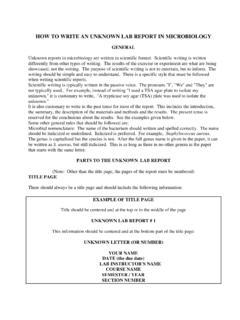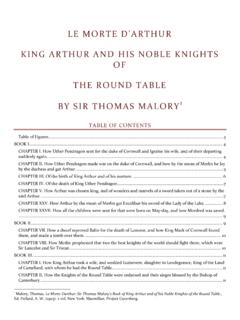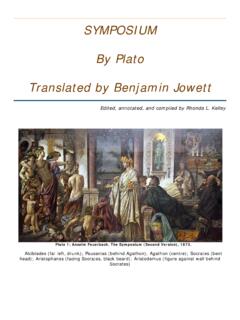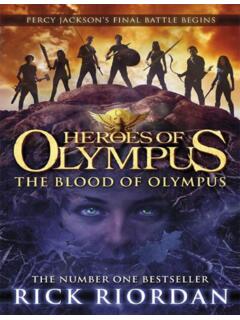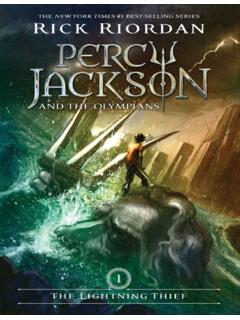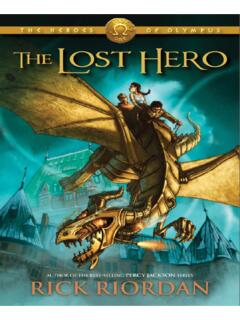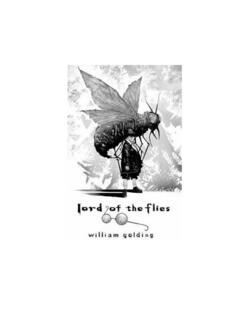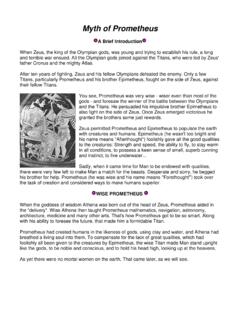Transcription of OVID'S METAMORPHOSES
1 OVID'S METAMORPHOSES TRANSLATED BY ANTHONY S. KLINE1 EDITED, COMPILED, AND ANNOTATED BY RHONDA L. KELLEY Figure 1 J. M. W. Turner, Ovid Banished from Rome, 1838. 1 #askline; the footnotes are the editor s unless otherwise indicated; for clarity s sake, all names have been standardized. The METAMORPHOSES by the Roman poet Publius Ovidius Naso (Ovid) was published in 8 , the same year Ovid was banished from Rome by Caesar Augustus. The exact circumstances surrounding Ovid s exile are a literary mystery. Ovid himself claimed that he was exiled for a poem and a mistake, but he did not name the poem or describe the mistake beyond saying that he saw something, the significance of which went unnoticed by him at the time he saw it. Though Ovid had written some very scandalous poems, it is entirely possible that this satirical epic poem was the reason Augustus finally decided to get rid of the man who openly criticized him and flouted his moral reforms.
2 In the METAMORPHOSES Ovid recounts stories of transformation, beginning with the creation of the world and extending into his own lifetime. It is in some ways, Ovid s answer to Virgil s deeply patriotic epic, The Aeneid, which Augustus himself had commissioned. Ovid s masterpiece is the epic Augustus did not ask for and probably did not want. It is an ambitious, humorous, irreverent romp through the myths and legends and even the history of Greece and Rome. This anthology presents Books I and II in their entirety. RLK BOOK 1 THE PRIMAL CHAOS I want to speak about bodies changed into new forms. You, gods, since you are the ones who alter these, and all other things, inspire my attempt, and spin out a continuous thread of words, from the world's first origins to my own time. Before there was earth or sea or the sky that covers everything, Nature appeared the same throughout the whole world: what we call chaos: a raw confused mass, nothing but inert matter, badly combined discordant atoms of things, confused in the one place.
3 There was no Titan2 yet, shining his light on the world, or waxing Phoebe3 renewing her white horns, or the earth hovering in surrounding air balanced by her own weight, or watery Amphitrite4 stretching out her arms along the vast shores of the world. Though there was land and sea and air, it was unstable land, unswimmable water, air needing light. Nothing retained its shape, one thing obstructed another, because in the one body, cold fought with heat, moist with dry, soft with hard, and weight with weightless things. SEPARATION OF THE ELEMENTS This conflict was ended by a god and a greater order of nature, since he split off the earth from the sky, and the sea from the land, and divided the transparent heavens from the dense air. When he had disentangled the elements, and freed them from the obscure mass, he fixed them in separate spaces in harmonious peace. The weightless fire, that forms the heavens, darted upwards to make its home in the furthest heights.
4 Next came air in lightness and place. Earth, heavier than either of these, drew down the largest elements, and was compressed by its own weight. The surrounding water took up the last space and enclosed the solid world. THE EARTH AND SEA. THE FIVE ZONES. When whichever god it was had ordered and divided the mass, and collected it into separate parts, he first gathered the earth into a great ball so that it was uniform on all sides. Then he ordered the seas to spread and rise in waves in the flowing winds and pour around the coasts of the 2 Sol Invictus, the sun god 3 Moon goddess. 4 A sea-goddess. encircled land. He added springs and standing pools and lakes, and contained in shelving banks the widely separated rivers, some of which are swallowed by the earth itself, others of which reach the sea and entering the expanse of open waters beat against coastlines instead of riverbanks.
5 He ordered the plains to extend, the valleys to subside, leaves to hide the trees, stony mountains to rise: and just as the heavens are divided into two zones to the north and two to the south, with a fifth and hotter between them, so the god carefully marked out the enclosed matter with the same number, and described as many regions on the earth. The equatorial zone is too hot to be habitable; the two poles are covered by deep snow; and he placed two regions between and gave them a temperate climate mixing heat and cold. THE FOUR WINDS Air overhangs them, heavier than fire by as much as water s weight is lighter than earth. There he ordered the clouds and vapours to exist, and thunder to shake the minds of human beings, and winds that create lightning-bolts and flashes. The world s maker did not allow these, either, to possess the air indiscriminately; as it is they are scarcely prevented from tearing the world apart, each with its blasts steering a separate course: like the discord between brothers.
6 Eurus, the east wind, drew back to the realms of Aurora,5 to Nabatea, Persia, and the heights under the morning light: Evening, and the coasts that cool in the setting sun, are close to Zephyrus, the west wind. Chill Boreas, the north wind, seized Scythia and the seven stars of the Plough:6 while the south wind, Auster, drenches the lands opposite with incessant clouds and rain. Above these he placed the transparent, weightless heavens free of the dross of earth. HUMANKIND He had barely separated out everything within fixed limits when the constellations that had been hidden for a long time in dark fog began to blaze out throughout the whole sky. And so that no region might lack its own animate beings, the stars and the forms of gods occupied the floor of heaven, the sea gave a home to the shining fish, earth took the wild animals, and the light air flying things. As yet there was no animal capable of higher thought that could be ruler of all the rest.
7 Then Humankind was born. Either the creator god, source of a better world, seeded it from the divine, or the newborn earth just drawn from the highest heavens still contained fragments related to the skies, so that Prometheus,7 blending them with streams of rain, moulded them into an image of the all-controlling gods. While other animals look downwards at the ground, he gave human beings an upturned aspect, commanding them to look towards the skies, and, upright, raise their face to the stars. So the earth, that had been, a moment ago, uncarved and imageless, changed and assumed the unknown shapes of human beings. THE GOLDEN AGE This was the Golden Age that, without coercion, without laws, spontaneously nurtured the good and the true. There was no fear or punishment: there were no threatening words to be read, fixed in 5 The dawn. 6 The constellations, Ursa Major and Ursa Minor.
8 7 Sometimes included among the seven Titans, [Prometheus] was the wisest of his race and gave human beings the useful arts and sciences. Jupiter first withheld fire and Prometheus stole it from the chariot of the Sun. Jupiter had Prometheus chained to the frozen rock in the Caucasus where a vulture tore at his liver night and day for eternity. (Kline) bronze, no crowd of suppliants fearing the judge s face: they lived safely without protection. No pine tree felled in the mountains had yet reached the flowing waves to travel to other lands: human beings only knew their own shores. There were no steep ditches surrounding towns, no straight war-trumpets, no coiled horns, no swords and helmets. Without the use of armies, people passed their lives in gentle peace and security. The earth herself also, freely, without the scars of ploughs, untouched by hoes, produced everything from herself. Contented with food that grew without cultivation, they collected mountain strawberries and the fruit of the strawberry tree, wild cherries, blackberries clinging to the tough brambles, and acorns fallen from Jupiter s spreading oak-tree.
9 Spring was eternal, and gentle breezes caressed with warm air the flowers that grew without being seeded. Then the untilled earth gave of its produce and, without needing renewal, the fields whitened with heavy ears of corn. Sometimes rivers of milk flowed, sometimes streams of nectar, and golden honey trickled from the green holm oak. THE SILVER AGE When Saturn8 was banished to gloomy Tartarus,9 and Jupiter ruled the world, then came the people of the age of silver that is inferior to gold, more valuable than yellow bronze. Jupiter shortened spring s first duration and made the year consist of four seasons, winter, summer, changeable autumn, and brief spring. Then parched air first glowed white scorched with the heat, and ice hung down frozen by the wind. Then houses were first made for shelter: before that homes had been made in caves, and dense thickets, or under branches fastened with bark. Then seeds of corn were first buried in the long furrows, and bullocks groaned, burdened under the yoke.
10 THE BRONZE AGE Third came the people of the bronze age, with fiercer natures, readier to indulge in savage warfare, but not yet vicious. The harsh iron age was last. Immediately every kind of wickedness erupted into this age of baser natures: truth, shame and honour vanished; in their place were fraud, deceit, and trickery, violence and pernicious desires. They set sails to the wind, though as yet the seamen had poor knowledge of their use, and the ships keels that once were trees standing amongst high mountains, now leaped through uncharted waves. The land that was once common to all, as the light of the sun is, and the air, was marked out, to its furthest boundaries, by wary surveyors. Not only did they demand the crops and the food the rich soil owed them, but they entered the bowels of the earth, and excavating brought up the wealth it had concealed in Stygian10 shade, wealth that incites men to crime.
